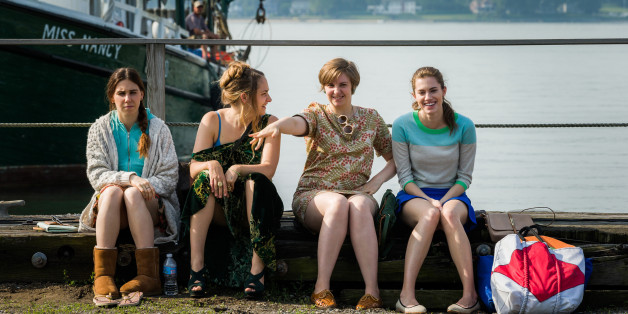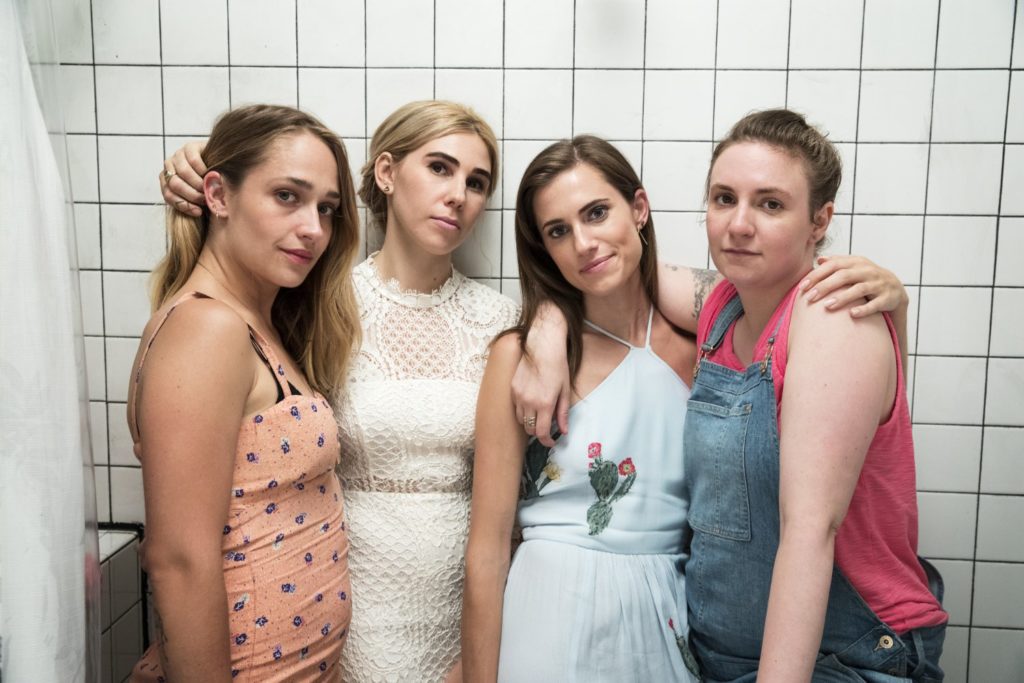I was 24 when Girls premiered, just like most of the characters. I remember seeing the trailer for season one, when a gynecologist tells Hannah during an exam, “You couldn’t pay me to be 24 again.”
And I remember thinking, “amen, sister.” In season one, Hannah worked an unpaid internship. I worked an unpaid internship. The age of 24 in the aftermath of the Great Recession held a generation back from kickstarting their careers in the way they expected to. The days of graduating with multiple job offers has ended, and this show addressed it head on.
And now that the Girls are in their late twenties, I’m winding my own twenties down and the show is still relevant in different ways. The penultimate episode, “Goodbye Tour,” took a sharp television twist and portrayed the girls not hugging it out and agreeing to live happily ever after all. “I think we should just call it,” Shoshanna says absently, clearly itching to get back to the polished new life she’s been creating for herself behind the scenes. After all, Shoshanna exhibited a minor obsesssion with Sex and the City in the pilot – a show this one is frequently compared to. So it’s fitting that that’s the lifestyle she’s been jockeying for all along. Shoshanna is my favorite of the girls, and I’m so proud to see her get everything she’s wanted. Even if we didn’t get to see her meet her husband-to-be at a cupcake ATM.

Unfortunatey, she’s right. Not all friendships are meant to last forever. Some are just a time period and maybe even a bit of geographical convenience. Evolving in and out of relationships isn’t just realistic, it can be healthy. And I love the realism of this show for owning up to that. The women of Sex and the City occasionally butted heads, but they’d always make up by the end of the episode to croon over an expensive new handbag.
That show may win for style and glamor, but GIRLS is a slice of what every twentysomething woman has experienced in at least one way. Lena Dunham really pulled it off. She orchestrated the production of a show that lived up to the first trailer’s hype. I still remember how excited I was at the prospect that there might be a show out there that spoke specifically to me, as an 80’s baby who still felt like a kid in so many ways.
Now, as the show winds down, I see that Dunham has refreshingly broken three common television cliches. First, there’s the friendship breakup. Next, the “soulmates” endgame mindfuck that so many past shows have put us through – Carrie and Mr. Big, Rachel and Ross, Ted and Robin. Adam and Hannah went their separate ways after a final shot at making it work. Somehow it feels more fitting. Third, she left plenty of loose ends untied. Hannah and Marnie, the only two main cast members to appear in the finale, don’t achieve any sense of “happily ever after” – if anything, Hannah is at the start of an unglamorous but hopefully fulfilling journey while Marnie still doesn’t seem any further along in her life than she was in the pilot.
I’m not blind to the feathers GIRLS has ruffled in its six seasons. There’ve been complaints about the lack of ethnic diversity amongst the main characters. People have pointed out endlessly that these characters are unlikable. And of course, there’s the body-shaming and criticism for the show’s portrayal of weird and awkward sex.
I won’t even pretend I didn’t cringe when Lena Dunham’s character Hannah played a gratuitous game of topless ping-pong in the season 2 episode “One Man’s Trash.” In fact, I used to watch GIRLS with a male neighbor who looked downright disgusted every time she appeared onscreen in less than her underwear. But now, as the show wraps up, it seems like we have moved one step forward. That’s one taboo that seems a bit less taboo now than it did in 2011.
Despite its controversies, which are, at the end of the day, minor – this show speaks to any millennial woman who’s struggled to find her way in the confines of what been branded “emerging adulthood.” Any woman, regardless of their ethnicity, and regardless of whether they consider themselves privileged and self-centered, knows the moments we saw these characters endure onscreen.
There was the time Marnie got laid off, dumped and had to move back in with her mother. Hannah dropped out of grad school and found her boyfriend had moved in with another girl without telling her. Jessa hosted a shotgun wedding followed by a quickie divorce and a failed stint in rehab. Shoshanna went to her first string of job interviews post-graduation, only to be shot down. “I just don’t understand why nobody tells you how bad it’s going to be in the real world,” she laments.
“It’s pretty much all they ever tell you,” Marnie counters. Neither girl is wrong.

Like the lives of my own twentysomething friends, the characters of GIRLS have experienced marriages, divorces, layoffs, questionable career paths, job relocations, big breaks, breakups. Life is messy and hopeless and complicated. Sometimes we take three steps back just to take one step forward.
“Here’s to Hannah taking the next step in a series of random steps,” Adam says in a not-so-well-meaning toast at the start of season 4.
I’ll miss the show’s awareness of itself and of the millennial lifestyle as a whole – hipsters, online therapy, sexting and all. Especially during Shoshanna’s rebrand of Ray’s coffee shop, when she takes a firmly anti-man bun stance. I wish I’d thought of that first. That Shosh, what a genius.
This show has been a strong influence on me for the past six years. I’m sad to see it go, and in some ways I feel like I’m not ready. But I’d rather see it go out prematurely in style than succumb to the tired, downhill fate that befalls TV shows that linger past their expiration date. So here’s hoping that all these random steps eventually lead the Feckless Foursome to a place of somewhat, sort of stability. And here’s hoping that Elijah becomes a Broadway star and figures out how to stop aging.
Leave a Reply